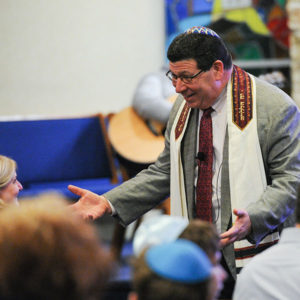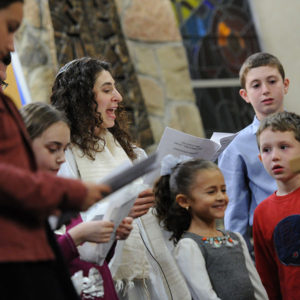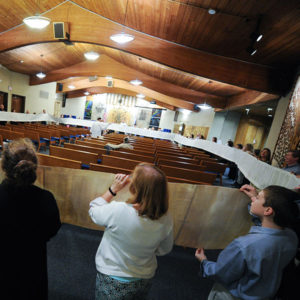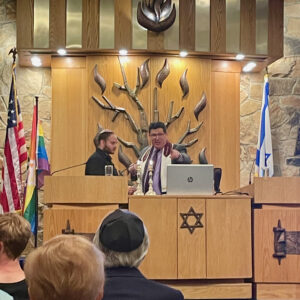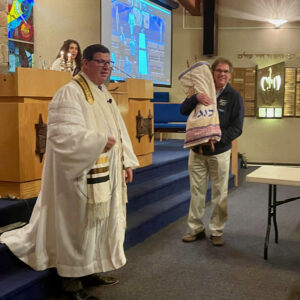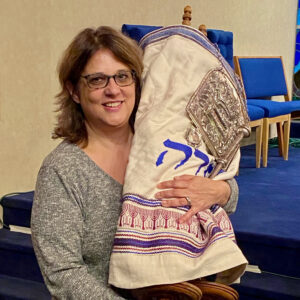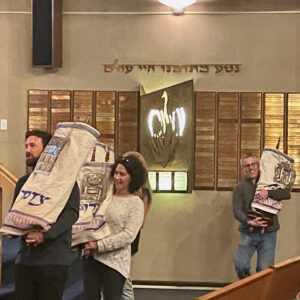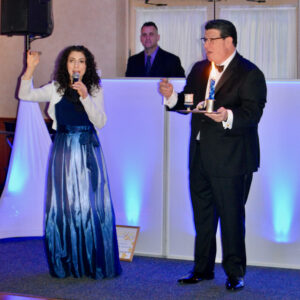Please Join Us
Prayer is a language that each of us speaks and hears in a different way. When we pray together, we try to find meaning within the chorus of diverse voices. With engaging sermons, stimulating teachings, and meaningful prayer intertwined with music, our clergy show us how the lessons from the past are relevant to our lives today.
Through a wide range of spiritual experiences we offer something for everyone, including weekly Shabbat evening and Shabbat morning services. In addition, special services are held throughout the year which include “Pray and Play,” “Shalom Yoga,” and so much more.
Our services are fully egalitarian (men and women participate equally). We believe we have found a healthy balance between the traditional and the creative. Services are a blend of Hebrew and English that helps everyone feel comfortable. Our prayer book, Mishkan T’filah, contains transliterations adjacent to all Hebrew prayers so that everyone, including guests, can participate easily and fully. We use both traditional and contemporary melodies. People who attend vary from those with traditional backgrounds to Jews by choice as well as guests of all faiths.
Schedule of Services:
Shabbat Evening Service
Erev Shabbat Services: Fridays, 7:30 pm (except the 1st Friday night of the month)
Kabbalat Shabbat Services: 1st Friday night of the month – 6:30 pmMorning Service
Saturdays
10:30 am, September - JuneRock Shabbat Services
Check here for more information on our musical Shabbat services.
Summer 2024 Friday Evening Shabbat Services Schedule
- June 21: Pride Shabbat – 7:30 pm @ Temple Shalom
- June 28: Shabbat in the Park – Northland Park (Aberdeen) – 6:30 pm
- July 5: Taste of Shabbat – 6 pm (Virtual Only)
- July 12: Shabbat @ Temple Shalom – 7:30 pm
- July 19: Shabbat @ the Beach – Ideal Beach (Middletown) – 6:30 pm
- July 26: Shabbat Under the lights (Temple Courtyard) – 7:30 pm
- August 2: Kabbalat Shabbat – 6:30 pm @ Temple Shalom (No Dinner)
- August 9: Shabbat @ Temple Shalom – 7:30 pm
- August 16: Shabbat @ the Beach – Location TBA – 6:30 pm
- August 23: Shabbat Under the lights (Temple Courtyard) – 7:30 pm
- August 30: Taste of Shabbat – 6 pm (Virtual Only)
Rabbi's Most Recent Shabbat Greetings:
Continuing from last week’s portion, Balak, we meet Pinchas, who at the conclusion of the story of the plague of Baal-peor (Num. 25), does a violent act. Balak ends with the men of Israel falling prey to their lustful appetites for non-Israelite women. They fornicate with them, marry them, and needless to say, God is furious! God tells Moses to have the leaders impaled publicly, which leads to this theatrical finale (Num. 25:6-9): Just as Moses finishes telling God’s orders to Israel’s officials, the Israelite Zimri – son of Salu, brings his Midianite woman, Cozbi – daughter of Zur, to a chamber in view of Moses and everyone else around. They proceed to copulate in what has to be one of the most disgustingly public, brazen, and defiant sexual acts in human history. We can imagine Moses and those around him looking on, aghast. But when Pinchas sees what is happening, he grabs a spear and stabs both Zimri and Cozbi in a single lunge.
And so, this week’s Torah portion, Pinchas (Numbers 25:10-30:1) begins with God praising Pinchas’ zealous (and impulsive) actions, bestowing upon him “My pact of friendship” (26:12).
What are some of the implications of Pinchas’ actions? Are Pinchas’ actions justified for the tribe’s security. Just how different is Pinchas from other violent zealots who act under God’s name?
Immediately following Pinchas’ act, God praises him and establishes a covenant of peace with him. This seems to validate Pinchas’ actions in the narrative, suggesting that God approved of his zealousness in defending the honor of God and the people. There is no misunderstanding that Pinchas’ actions are extreme and violent, leading to the death of two individuals. This raises questions about the appropriate use of zeal and violence in religious contexts. While he acted decisively against what he perceived as a threat to God’s honor, the severity of his response invites scrutiny. Furthermore, the narrative does not explicitly condemn Pinchas’ actions, but neither does it unequivocally endorse them universally. It presents a complex picture where divine approval is given but does not necessarily prescribe such actions as a normative response.
Some argue that Pinchas’ actions were justified as they halted a devastating plague (which had already claimed 24,000 lives) and were a direct response to a flagrant violation of God’s commandments. His action might be seen as stemming from a deep commitment to God’s law and the purity of Israelite identity. According to the rabbis, Pinchas differs from other violent zealots in that his actions are directly tied to a specific divine command and a particular context. He acted in response to a clear and immediate threat to Israel’s religious and moral integrity as defined by divine law. Other zealots who act violently in the name of God often lack such clear divine mandate and operate based on their own interpretations or ideologies.
According to Jewish law, the precedent of Pinchas is severely limited. Although his act was lawful, the Sages teach had Zimri turned around and killed Pinchas instead, he would be deemed innocent since he would have acted in self-defense. Had Pinchas killed Zimri even a moment after the act of immorality he would have been guilty of murder. And had Pinchas asked a court of law whether he was permitted to do what he was about to do, the answer would have been no. This is a rare instance of the rule, halakhah ve-ein morin kein, “It is a law that is not taught” (Sanhedrin 82a).
Why this moral ambivalence? The simplest answer is that the zealot is not acting within the normal parameters of the law. Zimri may have committed a sin that carried the death sentence, but Pinchas executed punishment without a trial. There are extenuating circumstances in Jewish law in which either the king or the court may execute non-judicial punishment to secure social order. But Pinchas was neither a king nor acting as a representative of the court. He was acting on his own initiative, taking the law into his own hands. There are instances where this is justified and where the consequences of inaction would be catastrophic. But in general, we are not empowered to do so, since the result would be lawlessness and violence on a grand scale.
In general we are commanded to “walk in God’s ways” and imitate God’s attributes. “Just as God is merciful and compassionate, so you be merciful and compassionate.” That is not, however, the case when it comes to executing punishment or vengeance. God who knows all may execute sentence without a trial, but we, being human, may not. There are forms of justice that are God’s domain, not ours.
SHABBAT SHALOM
Keep Reading